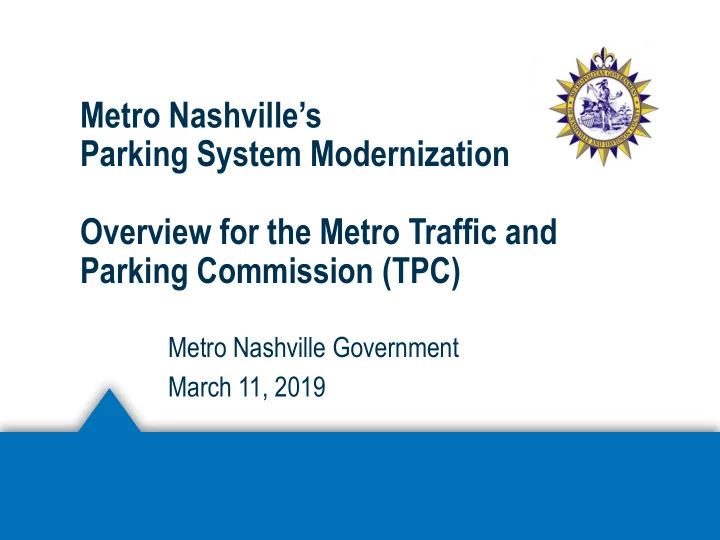

Metro Nashville’s Parking System Modernization Overview for the Metro Traffic and Parking Commission (TPC) Metro Nashville Government March 11, 2019
Introduction ► Leading cities modernize and actively manage on-street parking as part of urban planning, curb management, and “smart city” strategies. ► Metro’s on -street parking lacks the customer service features found in modern parking operations. The system requires handoffs among Metro This Photo by Unknown Author is licensed under CC BY offices and staff and lacks real- See the Downtown Multimodal Mobility Study (2014), the Urban Land Institute of Nashville’s Gear Up 2020 (2016), and Metro’s time reporting and data Connected Nashville smart-city plan (2018). analytics. 2
Principles that Guided our Modernization Analysis ► Metro and the TPC should continue to control parking-related policies and procedures. ► Metro should create value through technology innovation and operational excellence, as contrasted with maximizing rates and fees. ► Any agreement should be flexible enough to accommodate transportation changes. ► Customer service and improved access to commercial areas should be a central focus. ► Any agreement should anticipate and accommodate future changes for electric vehicles and bicycling. ► Minimize environmental impacts. ► While ensuring that parking remains affordable, any agreement should guarantee an up- front payment (e.g., $30M) as well as replace Metro’s current net revenue from parking ($1.5M/year). 3
Metro Nashville’s Parking Modernization Objectives ► Improve the parking experience for retail customers; ► Using technology, reduce congestion caused by drivers This Photo by Unknown Author is licensed under CC BY-SA This Photo by Unknown Author is licensed circling to look for a space; under CC BY ► Support neighborhood parking, This Photo by Unknown Author is licensed under CC BY-SA street sweeping, valet, and rush hour management; ► Increase system reliability and reduce downtime; This Photo by Unknown Author is licensed under CC BY-SA ► Maximize convenience and payment options; and ► Produce real-time, accurate data on parking for the City. This Photo by Unknown Author is This Photo by Unknown Author is licensed under CC BY licensed under CC BY-SA 4
Analysis and Due Diligence ► Private partners support public parking operations across the U.S. and the world – with a broad range of services. ► We propose a concession agreement - a contract between a company and Metro that gives the company the ability to manage a specific operation subject to Metro’s oversight/control. ► Advantages of a concession can include: An up-front cash payment; The partner pays to modernize the system and update technology; Creates opportunities for revenue sharing; and Can include “ exit ramps ” at defined costs if Metro wants to terminate. ► Has the ability to create significant value through automation and operational improvements. 5
The Process ► Conducted due diligence, analyzed best practices, and completed stakeholder interviews over the course of more than a year. ► Metro issued a Request for Quotations (RFQ) last summer to explore whether a concession would allow Metro to accomplish all its objectives. ► Five of the leading parking management teams in the country responded to the RFQ, offering deep subject matter expertise. ► The proposals made it clear that a public-private partnership could result in significant benefits to Metro. ► The scope of services for on-street parking was comprehensive, but excluded Metro’s garages. 6
Proposed Policy Changes ► In order to accomplish Metro’s policy goals, we propose several policy changes, including: Policy Change Existing Proposed Peer Cities Enforcement hours 8:00 a.m. to 6:00 p.m. 8:00 a.m. to 10:00 p.m. Memphis and Knoxville (zones to 10 p.m.); Austin and Minneapolis (zones to midnight); Denver to 2 a.m. Sunday hours None Same as Mon. – Sat. Minneapolis, Portland, and Denver have Sunday hours to assist in turnover and benefit retailers. Meter rates $2.00 in CBD; $1.50 in other Increase by 25 cents and CPI Metro is comparable to TN thereafter. cities, but underpriced relative to Minneapolis, New Orleans, Baltimore and Seattle. Vendor to administer street Subject to oversight and Still subject to oversight and Relatively common sweeping enforcement, approval by the TPC. approval by the TPC. Permits valet parking, loading stay in effect until they expire zones, and residential and the new system is permits. implemented. 7
Proposed Policy Changes Policy Change Existing Proposed Peer Cities Fines $11 $25; Make it easier to pay and Consistent with Denver, but extend meter times and ensure lower than Atlanta ($35) and fines encourage compliance. Minneapolis ($45). Spaces 2,000 spaces in four Metro Expand in The Gulch, West Nashville would be larger than Council Districts: 19, 21, 18, End, SoBro, and the CBD. Austin’s system today (3,000) and 17. Add 500 metered spaces per but smaller than New Orleans year for four years. (Based on (4,500), Denver (6,200), and demand, engineering analysis, Minneapolis (8,000). stakeholder input, and Commission approval). Temporary meter removal N/A 150 with no penalty Typical Bikeways N/A Accommodate planned 3rd N/A Avenue, Commerce Street, and Union Street/Woodland and WeGo Public improvement along West End Avenue. Green permit 142 green permits today, with a Phase out the small green N/A very significant cost projected permit program and find other, over time more effective ways to achieve green goals. 8
How much is a Metro Parking Modernization worth? ► Subject to myriad variables, including final contract negotiations, we think Metro’s system could be worth as much as $250M - $350M over the 30- year contract term. ► Other transactions include: City Spaces Value Notes Indianapolis 4,000 on-street $20M up front and 900% increase in net revenue; 80% $300M over time driven by operating improvements Ohio State Univ. 37,000 spaces $483M up front On-street and garage Chicago 36,000 spaces $1.16B up front Not our model ► This project will result in no anticipated layoffs of Metro employees. 9
Recommend
More recommend